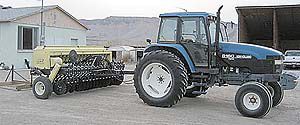Farmers in western Emery County will have a new planting option this spring. The San Rafael Conservation District and the Castleland Resource Conservation and Development Council received a Conservation Innovation Grant from the USDA to purchase two no-till drills and two transport trailers. Local farmers will be able to lease the drills from the conservation district on a per-acre basis.
The no-till drills are capable of planting a variety of seeds including small grains, alfalfa and other legumes, and grasses. Planting can be done without plowing or other tillage. The drills can also be used in conventional tillage systems or minimum (mulch) tillage systems. By reducing tillage, farmers will save many hours of labor and conserve fuel. One source estimates that no-till saves nine to 14 gallons of fuel per acre compared to conventional plowing, disking, etc. Other benefits include reduced soil erosion, less air pollution from dust and tractor operation, improved soil structure, less evaporation of water from the soil surface, and an immediate impact on carbon dioxide sequestration.
To acquaint farmers with no-till technology, a workshop and dinner will be held on Feb. 13 in the metal building at the Ferron City Fairgrounds. The workshop is sponsored by the San Rafael Conservation district, USU Extension Service and Castleland Resource Conservation and Development Council.
One of the drills will be on display at 4 p.m. and throughout the workshop. Dinner will be at 6 p.m. and the workshop will follow.
The workshop will feature Robert Newhall from Utah State University. Newhall has spent many years working with no-till technology in Utah and will share his knowledge and recommendations with attendees.
Topics of discussion will include: 1) the advantages and disadvantages of a no-till system; 2) can a person use no-till exclusively; 3) will a landowner have to plow to avoid soil compaction; cultivation and planting recommendations; 4) planting depth and seeding rates; 5) soil fertility; 6) crop rotation; 7) irrigation (sprinkling and flood); 8) weed control; 9) other items from discussion and questions.
As an added item of information, Jeff Berman, from San Juan Bioenergy will be available from 5-6 p.m. to answer questions from anyone interested in raising biofuels crops such as sunflower, safflower or canola. These crops are raised for the oil content and are used in the food market or in the biofuels market. Berman will explain their program, prices offered for the oil seeds, contracting, etc.
For information please call Dennis Worwood at 435-381-2381.
The no-till drill option

